Producer Dylan Clark On 'War For The Planet Of The Apes' Aspirations As A 65mm Epic Western
While on the set of War for the Planet of the Apes, we had an extensive sit-down interview with Planet of the Apes series producer Dylan Clark. Clark is the mastermind behind the last three Ape films and has a lot of information and insight to share about the franchise and the upcoming film. Hit the jump to read our Dylan Clark War for the Planet of the Apes interview.
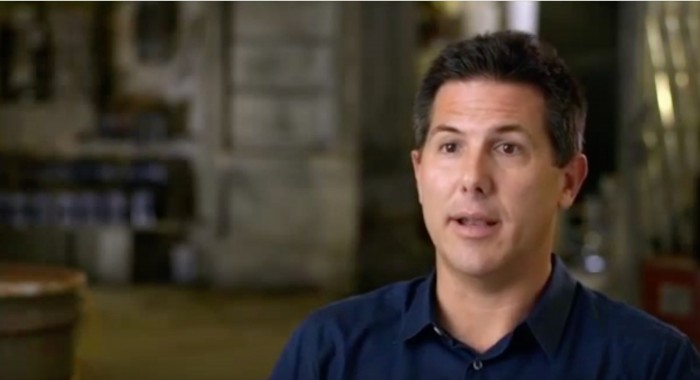 How many years after Dawn of the Planet of the Apes is the film set?Clark: We're calling it two years. It'll probably be documented in the movie as two years... And that's because one of Matt [Reeves]'s great strengths was to come in after Rupert [Wyatt] and say here's what you did really well on Rise and here's why I love Apes: "You really immersed me in the ape's world and I really want to experience everything that's going on with apes and humans and the world that you've created with these characters."
How many years after Dawn of the Planet of the Apes is the film set?Clark: We're calling it two years. It'll probably be documented in the movie as two years... And that's because one of Matt [Reeves]'s great strengths was to come in after Rupert [Wyatt] and say here's what you did really well on Rise and here's why I love Apes: "You really immersed me in the ape's world and I really want to experience everything that's going on with apes and humans and the world that you've created with these characters."
What we never wanted to do was jump too far down the road so that we weren't watching really detailed chapters into where the apes were in their intelligence. The fun is watching the next year of evolution. What's happening now? We know somewhere down the road the original Ape franchise got us to walking and talking apes. They were sitting around a tape like this, with recorders, and were drinking out of their cups and there was a lot of gesticulation and you're like, "Jesus — this is crazy." We're not quite doing that. We're actually trying not to do that.
We really want to create an ape society and culture and mythology and characters where we're seeing them be apes. And what does it mean to grapple with intelligence? How do you start to become the leading species on the planet? That's the fun – so two years felt like a good chunk to go ahead. Another thing — and we never really talk about this Matt, Peter [Chernin] and I but the truth is a lot of audience members are looking at films like episodic television. So you have all these great cable TV shows. Game of Thrones, The Walking Dead — and you get to really document minute-by-minute segments of these people's lives and they love it and it's shot like movies now. It's just great stuff. Film has started to take note.
There's a lot of cynicism about "oh god another redo of this or another chapter of this" but the truth is once you have great characters, the audience wants more. We really do believe Caesar is a great character. We love him. We love Andy Serkis. We love the ape family that's been created. We love Maurice. We even love dopey Rocket. Rocket's going to do some great things in this movie. We have some other apes as well we're developing. Another thing that was important to us — on Dawn, Matt has this great opening shot pulling out on Caesar's eyes and we said to the audience this is going to be a different looking movie and there's rain and it's in 3D and it's pretty cool. And then the end of them movie, we push in on Caesar, a different Caesar — much more pensive. He has been told by his human best friend Jason Clarke that they've made contact up north and that a significant military threat is coming. Not just colonists with pitchforks and bb-guns. That's going to be a major complication. And hopefully, you see that drama and conflict in Caesar's eyes.
Another thing is that Caesar has broken one of his main tenets. He's killed an ape. He killed Koba. And despite Koba going completely off the rails and fucking it up for the entire ape and human communities. Co-existence was almost achieved until you had crazy Koba on one side and crazy Gary [Oldman] on the other. Caesar had to do something but that act was not lost on him and not forgotten. So when we push in on him that was a key moment. So when we start this movie two years later, there's a serious thing going on. They're fighting armed forces — guys in military fatigue and assault rifles and weaponry. This isn't a ragtag group of militia and Caesar's had to have this horrible war against the humans — a war he didn't start. Koba started this thing. He just feels responsible for it. What happens in this because of ape losses and human losses and just chaos and pain, Caesar is at some point not fit to lead the apes and goes on a dark journey to end this war. We're always striving not just for great entertainment but quality entertainment. We're trying to give the audience something that resonates from the character. There are themes. This is also a war inside of Caesar. All the things that have happened under his leadership from Rise to Dawn to this movie. Over the course of this movie, he's wrestling and grappling with how to make that right.
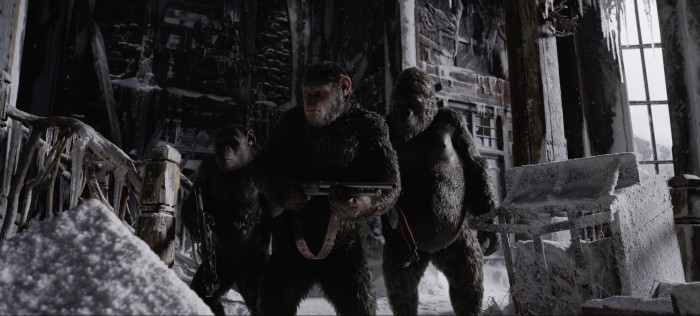 Since it is called War — at the beginning of the film are we already at war?Clark: You are right at war at the beginning.So it's not the beginning of war...Clark: I don't want to give it away because I honestly feel... I believe we have the best opening of all of the movies. What I really like about it is – I think the audience has been waiting for this kind of fight to happen but I also think they don't want to just see human army vs. ape army. You can't have an entire movie of that. What I love about it — is that the journey really is the war inside of Caesar. We're in the apes' point of view. We're experiencing this movie through Caesar. Last movie — Koba took a lot of the stuff. Koba was fantastic. The narrative weight is now on Caesar's back for this one.
Since it is called War — at the beginning of the film are we already at war?Clark: You are right at war at the beginning.So it's not the beginning of war...Clark: I don't want to give it away because I honestly feel... I believe we have the best opening of all of the movies. What I really like about it is – I think the audience has been waiting for this kind of fight to happen but I also think they don't want to just see human army vs. ape army. You can't have an entire movie of that. What I love about it — is that the journey really is the war inside of Caesar. We're in the apes' point of view. We're experiencing this movie through Caesar. Last movie — Koba took a lot of the stuff. Koba was fantastic. The narrative weight is now on Caesar's back for this one.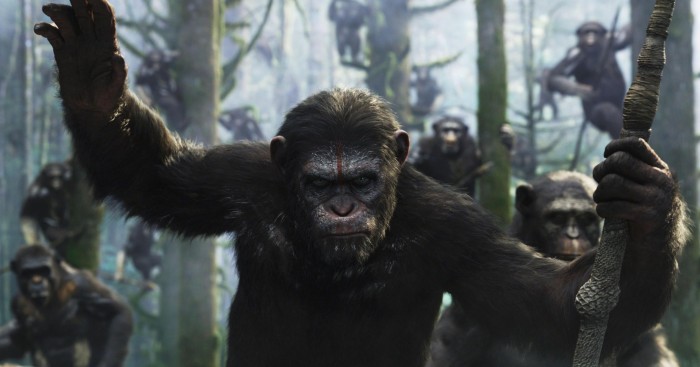 Originally Rise was called Caesar — and I asked you then is Caesar the main star of this movie and you stopped it off and said no it's about James Franco...Clark: Well I was tricking you. I think I was lying to you. Because the best thing that ever happened to me was when I read that script and I thought ok — this is about James Franco — neurosurgeon. Crazy! And I love James Franco but... crazy. And the audience is watching that movie of Franco trying to cure Alzheimer's and then he adopts this little baby chimp and he's testing it on the chimp. He loves the chimp and then something happens at the end of the first act. The plot is Caesar goes away but the thing that happens is that the movie becomes Andy's movie at that point and I had never seen that in a script. I had never seen a movie like that with a radical departure like that and it works. So I was manipulating you.It still seems like humans were a part of the last movie. For this one, it doesn't feel like they're have been many human actors that have been announced....Clark: Woody Harrelson, Gabriel Chavarria, Amiah Miller...Are the apes now finally the stars of this movie?Clark: I would say they've been all along. I didn't answer the question completely. I didn't lie to you [in reference to James Franco as the star of Rise] but I think I was holding back because I really felt like when people saw Rise... A lot of people came up to me press and friends and said that's a great narrative device. And James Franco is a big deal — a great actor. John Lithgow is no slouch. And you think you're following the humans and then you go over here and you're like whoop this is the craziest movie ever and it's Andy Serkis doing all this stuff and you're watching him have to deal with regular apes at that point. It's cool... emotionally cool. What I love about these movies is that when I come in and sit down with smart guys like yourselves... I love that everyone is bringing their own interpretation of what it means that we're saying to the world because I think there's a lot of shit going on in the world and the apes are a good mirror into what humans are doing today. There are more apes in this movie than there are humans but I will say for balance — we wanted the human characters to provide as much obstacle and conflict and resistance to what Caesar is trying to do. And so we really looked at the movie almost in Western terms or great epic terms. Who could be paired against Andy Serkis on the human side that would give him a run for his money? And we liked Woody Harrelson.
Originally Rise was called Caesar — and I asked you then is Caesar the main star of this movie and you stopped it off and said no it's about James Franco...Clark: Well I was tricking you. I think I was lying to you. Because the best thing that ever happened to me was when I read that script and I thought ok — this is about James Franco — neurosurgeon. Crazy! And I love James Franco but... crazy. And the audience is watching that movie of Franco trying to cure Alzheimer's and then he adopts this little baby chimp and he's testing it on the chimp. He loves the chimp and then something happens at the end of the first act. The plot is Caesar goes away but the thing that happens is that the movie becomes Andy's movie at that point and I had never seen that in a script. I had never seen a movie like that with a radical departure like that and it works. So I was manipulating you.It still seems like humans were a part of the last movie. For this one, it doesn't feel like they're have been many human actors that have been announced....Clark: Woody Harrelson, Gabriel Chavarria, Amiah Miller...Are the apes now finally the stars of this movie?Clark: I would say they've been all along. I didn't answer the question completely. I didn't lie to you [in reference to James Franco as the star of Rise] but I think I was holding back because I really felt like when people saw Rise... A lot of people came up to me press and friends and said that's a great narrative device. And James Franco is a big deal — a great actor. John Lithgow is no slouch. And you think you're following the humans and then you go over here and you're like whoop this is the craziest movie ever and it's Andy Serkis doing all this stuff and you're watching him have to deal with regular apes at that point. It's cool... emotionally cool. What I love about these movies is that when I come in and sit down with smart guys like yourselves... I love that everyone is bringing their own interpretation of what it means that we're saying to the world because I think there's a lot of shit going on in the world and the apes are a good mirror into what humans are doing today. There are more apes in this movie than there are humans but I will say for balance — we wanted the human characters to provide as much obstacle and conflict and resistance to what Caesar is trying to do. And so we really looked at the movie almost in Western terms or great epic terms. Who could be paired against Andy Serkis on the human side that would give him a run for his money? And we liked Woody Harrelson.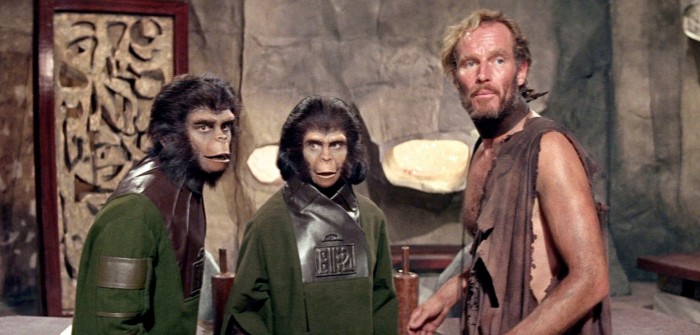 How much are you looking to replicate the original films?Clark: In the first film, we did some easter eggs. We shot the Icarus up. It wasn't my taste but we even used some dialogue from the original. There were some fights about that one. Look there are certain characters and things you will see in this movie too. Again — we pay some homage. Some of it's just cool for the mythology. But we're never sitting in our story meetings, going how do we link up to what they did in Beneath or God they did that in Conquest — can we do a version of it better? never!
How much are you looking to replicate the original films?Clark: In the first film, we did some easter eggs. We shot the Icarus up. It wasn't my taste but we even used some dialogue from the original. There were some fights about that one. Look there are certain characters and things you will see in this movie too. Again — we pay some homage. Some of it's just cool for the mythology. But we're never sitting in our story meetings, going how do we link up to what they did in Beneath or God they did that in Conquest — can we do a version of it better? never!
We love most of those movies — some of them are not so good. We revere them. they were a great five-run but they're over here... And I think that's what the audience wants. A contemporary audience doesn't want to relive the old mythologies. Those movies were made at a certain time for a particular audience about different things. These are different characters and we have the ability to realize them in authentic ways. We want to create our own films and further the mythology.
How has the ape language evolved?Clark: We bring you in two years later... What would they have learned in two years? Would Rocket learn how to speak? He's not the smartest guy in the world. He leads with his fist. He's been kind of a thick dude but he's emotional. So we're more interested in how he expresses his emotions through actions.
That's the other thing — it's a great silent movie. And Terry [Notary] is so brilliant at physical movements. He's a vaudevillian actor. He's off the charts great so he can communicate more with a gesture and a huff than a piece of dialogue so we're constantly thinking about it.
Look some of the younger apes probably speak more because if you look at any generation — immigrants come over and their kids pick up the language in no time. My parents can't even email anymore. The only thing we did think about — Steve Zahn is in this movie. Steve Zahn is amazing. Steve Zahn plays an ape — a cool ape.
Like a chimpanzee?Clark: Yeah. He speaks in a great way.Does he wear sunglasses?Clark: No — we don't really want to see apes driving cars or putting on robes and gesticulating with their index fingers. We've seen that — what we haven't seen is again apes trying to figure out how to do all this stuff. And meeting new apes that all of the sudden where did this guy come from? how is he able to talk? are other apes in the world smart? so we are constantly looking ahead for what else we might want to do in this world. How else can we show the evolution of these characters? Who else can we bring in both on the human side and the ape side?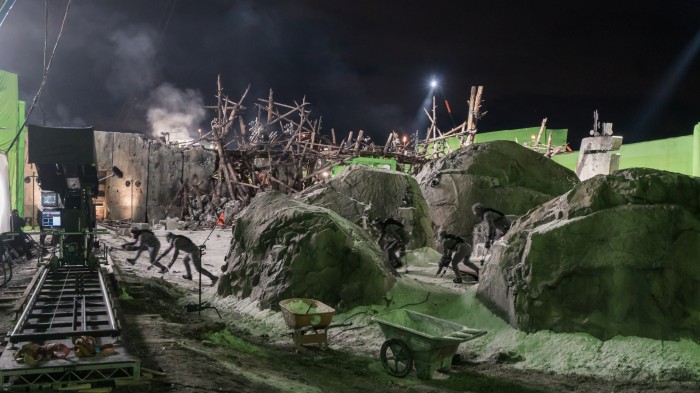 We've seen a lot of crosses and apes being crucified. How important is that biblical imagery to this film?Clark: I went to Catholic school — reporters come to me and say they see a lot of Noah in this. and I'm like "Really." Moses — of course. Jesus has been referred to. We're not making a bible story. We are the most practical minded people ever. Our production designer James Chinlund — he will say things like this to me: apes don't dig. So it's not meant to be a cross — but if it's perceived as a cross, that might be an interesting conversation but that's not the intent. the intent it serves in the movie is very specific and again — we do look at certain — [Akira] Kurosawa is one our favorite directors. we try not to rip off any of the masters but if we get compared to the master in a good way — we go alright. In a bad way — we go what are you talking about?Are we going to get a more global perspective on the ape's society?Clark: You're going to get a global perspective on the state of the world. Global perspective of the ape society – no, because again we're following these main apes and specifically Caesar. Steve Zahn's going to show up and give us a taste of the possibility and the question of what else is out there. But the drama and the emotional focus is Caesar how are you going to end this war both externally and internally. We really wanted to get out of San Francisco in this movie so one of things that were important to Matt was let's start in a battle.
We've seen a lot of crosses and apes being crucified. How important is that biblical imagery to this film?Clark: I went to Catholic school — reporters come to me and say they see a lot of Noah in this. and I'm like "Really." Moses — of course. Jesus has been referred to. We're not making a bible story. We are the most practical minded people ever. Our production designer James Chinlund — he will say things like this to me: apes don't dig. So it's not meant to be a cross — but if it's perceived as a cross, that might be an interesting conversation but that's not the intent. the intent it serves in the movie is very specific and again — we do look at certain — [Akira] Kurosawa is one our favorite directors. we try not to rip off any of the masters but if we get compared to the master in a good way — we go alright. In a bad way — we go what are you talking about?Are we going to get a more global perspective on the ape's society?Clark: You're going to get a global perspective on the state of the world. Global perspective of the ape society – no, because again we're following these main apes and specifically Caesar. Steve Zahn's going to show up and give us a taste of the possibility and the question of what else is out there. But the drama and the emotional focus is Caesar how are you going to end this war both externally and internally. We really wanted to get out of San Francisco in this movie so one of things that were important to Matt was let's start in a battle.
They're fighting military people. This is a war after all. This looks like the Muir Woods but not the Muir Woods where their home was burnt down. But we know they left San Francisco. It's been about two years. They didn't get too far out. They hunkered down in the woods as an ape would do and they got it on. And then after that through Caesar's conflict and turmoil, he departs with his posse... It's a western. He's Clint Eastwood in this movie.
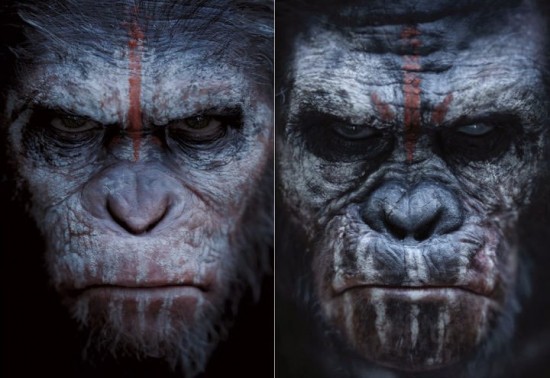 Is Koba alive?Clark: I don't know — I can tell you 100% Koba's not alive in this movie. We did do that.Were you consciously doing [the Koba audio cue in the credits of Dawn] to mess with people?Clark: We're never trying to manipulate and mess with... When you finish the movie, you hope you did a good job but you never know. When we finish this movie, then we have to go in post for a year. We believe in our story, our team, Fox... but you don't know. So you put the movie out and then it's up to you guys to go oh that was good. So there was talk... Matt and I — we loved Toby Kebbell. Koba is a great character. He was great for entertainment and for Caesar. Caesar loved Koba.
Is Koba alive?Clark: I don't know — I can tell you 100% Koba's not alive in this movie. We did do that.Were you consciously doing [the Koba audio cue in the credits of Dawn] to mess with people?Clark: We're never trying to manipulate and mess with... When you finish the movie, you hope you did a good job but you never know. When we finish this movie, then we have to go in post for a year. We believe in our story, our team, Fox... but you don't know. So you put the movie out and then it's up to you guys to go oh that was good. So there was talk... Matt and I — we loved Toby Kebbell. Koba is a great character. He was great for entertainment and for Caesar. Caesar loved Koba.
He was his brother until the humans showed up and Koba could not contain his rage and everything was lost. We loved what that said about the world but we also loved what it said emotionally for these two characters. We were really sad to see him in visual effect turnover meetings tumble down three hundred feet and die in a fiery ball of hell. Yeah — there were conversations. They wouldn't have done that to Darth Vader... So we were like god did we make a mistake killing Koba? But again we have to look each other in the eyes and say — could anybody survive that fall? For real? And the answer is 'No' and then we were sad.
But are we going to see any antagonism within the ape community?Clark: Yes.Will we see gorillas vs. apes?Clark: We're always looking for good storytelling. And in good storytelling there's always got to be conflict both external and internal. It's not harmonious. When you've been in war for two years and there was already a big faction... we couldn't get too deep in with those characters with Koba but there was a lot of Koba sympathizers. There were a couple guys sitting on the rock basically flipping Caesar off. You're making a mistake here dude. These humans cannot be trusted. I don't care if Keri Russell is so pretty. I don't trust her. She's going to do something bad to us. And that's the world we live in right?What's the plot of the movie?Clark: Caesar goes on a journey at the end of the first act because he doesn't believe he's fit to lead. Apes have found where they think they can live without human fighting. A promised land, so to speak. A place where they can start over. A safer, more beautiful land they can inhabit. And he goes on a dark quest because he thinks... Like the humans that were attacking them in the beginning of the movie, there's a scene that they basically say if we can kill Caesar, the apes head is cut off and we can win this war. Caesar believes if he can kill Woody, they can win this war and let the apes that I'm leading start anew. It doesn't work out that way.
Caesar on his own gets caught in his own thing... [Caesar and his group] pick up a blonde girl, a little girl — along the way and there's a great scene, they're going to leave her and she's young and not able to take care of herself and Caesar says we're not taking her and Maurice says to Caesar — I understand but I'm not leaving her. And you love Maurice. And the next cut is the little girl on the back of a horse, holding onto a big orangutan, looking at Caesar.
I will say this movie is dark — there are dark elements to it. There are much lighter elements too. I think we're trying to find a much better back and forth balance between very impactful emotional drama and how it effects Caesar and the group but also give entertainment and lighter moments. There's levity... But there are more reasons to smile and laugh than there were in prior movies.
Caesar finds that his apes have been captured and that's where we are. We're here seeing what some of the apes have to do. And they're being asked to do a task only apes could do and there's a bigger third act ending and then Caesar has to come into Dodge and it's on. The drama is how is Caesar going to free these apes. Is Caesar going to best and vanquish this bad guy in Woody Harrelson? But the real drama is inside Caesar — are you going to reclaim your morality? Are you going to find your humanity? You're the most human of all the characters. You're the most just, you're the most right. it seems you've lost your way a little bit in this movie. Can you regain it back? That's the suspense and the drama that plays out through the course of this thing.
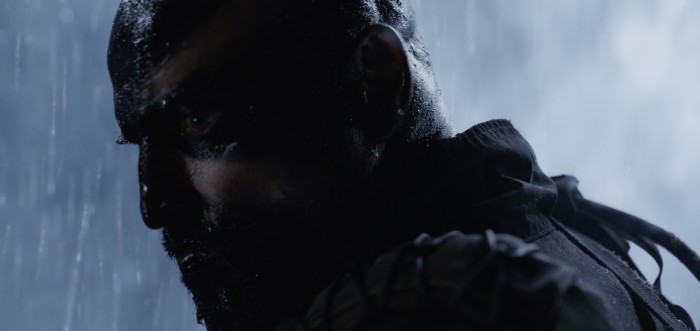 Who is Woody Harrelson's character? Is he just unrepentantly evil?Clark: Even the most truly evil people on our planet today. I'm sure if you had one moment in time — you could see them with their kids and go oh my god... Did you watch the Sean Penn interview with El Chapo? Now there might be some theater there but he really came off as some farmer not looking for a fight. We're not interested in painting people black and white. We're looking for the grey because that's the complicated world we live in so we like to paint all our characters with very strong points of view.
Who is Woody Harrelson's character? Is he just unrepentantly evil?Clark: Even the most truly evil people on our planet today. I'm sure if you had one moment in time — you could see them with their kids and go oh my god... Did you watch the Sean Penn interview with El Chapo? Now there might be some theater there but he really came off as some farmer not looking for a fight. We're not interested in painting people black and white. We're looking for the grey because that's the complicated world we live in so we like to paint all our characters with very strong points of view.
He has a point of view. It doesn't coincide with the ape's point of view. He's against Caesar. In a different time and a different world they might have been able to coexist. But where circumstances have brought these two to the table now in this movie, they cannot be on the same side.... Who's going to inherit the planet? Who's going to win? That's what this is about. The dominant species wins. Woody Harrelson is a smart character. He knows they're stronger. He knows they're faster. He knows they're as smart now. He realizes we have a big time problem. He knows they're mad. So what do you do about that when you're dealing with the virus?
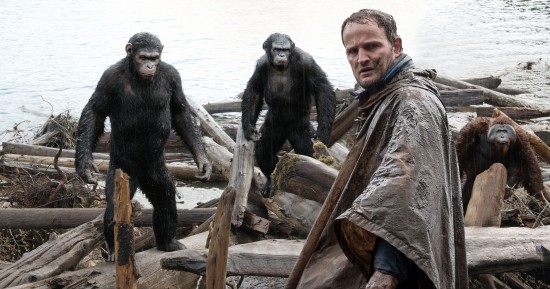 Any talk about bringing back Jason Clarke and Keri Russell?Clark: Yeah — we're thinking always about those guys. And I said to the press in the original script of Rise, James Franco dies and we shot that and it was bad. it was bad for two reasons: it was a horribly staged thing. Brian Cox had a shotgun and shot him from a hundred feet away. And emotionally it wasn't the right thing to do. You wanted a scene where the surrogate father said to the surrogate son, "I'm sorry. I screwed up. I want you to win and survive. Go." And then he went up to the tree and we believed he was going to make it. And we felt good about that. And that was important to us. we wanted to feel good about where the humans are finished so you felt behind the apes. But then we thought — there's a virus and the virus killed James Franco. That's how we dealt with it. and no one really asked because that was the world of our movie. In this movie we've already set a precedent. We really wanted to get away from that drama and we did radio up north and bring in these heavies. We know that's not Jason and... Gary Oldman blew himself up...What about snow and its effect on technology?Clark: We are constantly trying to push technology. It's helpful if it's used to tell the story. We're always trying to make it more interesting to look at. Motion capture probably has been done in the snow. But not like we're doing. And so I'm saying for the record we're doing it for the first time: motion capture in the snow. so we have performance capture actors doing their thing and then we have motion capture capturing that action out in snowy locations. It's so cool.
Any talk about bringing back Jason Clarke and Keri Russell?Clark: Yeah — we're thinking always about those guys. And I said to the press in the original script of Rise, James Franco dies and we shot that and it was bad. it was bad for two reasons: it was a horribly staged thing. Brian Cox had a shotgun and shot him from a hundred feet away. And emotionally it wasn't the right thing to do. You wanted a scene where the surrogate father said to the surrogate son, "I'm sorry. I screwed up. I want you to win and survive. Go." And then he went up to the tree and we believed he was going to make it. And we felt good about that. And that was important to us. we wanted to feel good about where the humans are finished so you felt behind the apes. But then we thought — there's a virus and the virus killed James Franco. That's how we dealt with it. and no one really asked because that was the world of our movie. In this movie we've already set a precedent. We really wanted to get away from that drama and we did radio up north and bring in these heavies. We know that's not Jason and... Gary Oldman blew himself up...What about snow and its effect on technology?Clark: We are constantly trying to push technology. It's helpful if it's used to tell the story. We're always trying to make it more interesting to look at. Motion capture probably has been done in the snow. But not like we're doing. And so I'm saying for the record we're doing it for the first time: motion capture in the snow. so we have performance capture actors doing their thing and then we have motion capture capturing that action out in snowy locations. It's so cool.
On 65mm — which is awesome. That experience is going to be great. This movie will be able to be seen in 3D. We shot it in 3D last time because we didn't have enough time in our post schedule to convert it; we have time now. Not to hurt the 3D camera companies but the 3D conversion companies have gotten so good at this that if you give them enough time, we can deliver for the audience that wants 3D a very good experience.
We're shooting this in native 65mm for filmmaking reasons, for directorial reasons and I'm very excited about it. We have bigger sets. We're outside more. We have more rain, more snow. More action. More levity. More emotion. More, more, more...
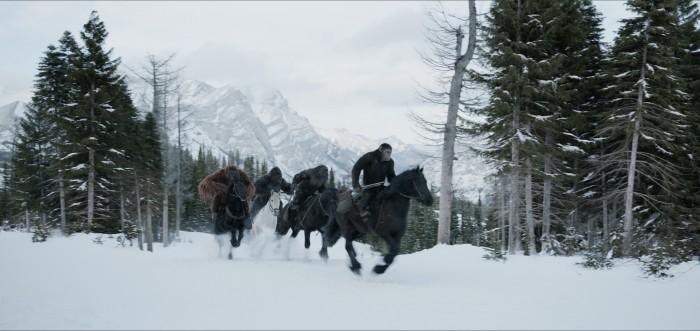 You mentioned offhand this is a Western and Caesar's Clint Eastwood.Clark: I didn't say he is Clint. I referenced Clint Eastwood. Caesar's Caesar.We're getting more and more that this is like a huge epic Western. Can you talk about that?Clark: Caesar goes on a Western like journey to kick Woody Harrelson's ass. And he finds out that Woody Harrelson has captured his apes. Feeling responsible, because he wasn't leading his apes, he goes in to get them. And he basically get captured. So they are all at this camp, which is at the top of we're calling it the Sierra Mountains. A fictitious facility. It was a repurposed after the viral apocalypse, it was a military installation that housed a lot of military stuff, weapons and things like that. But it also became let's call it an internment camp.
You mentioned offhand this is a Western and Caesar's Clint Eastwood.Clark: I didn't say he is Clint. I referenced Clint Eastwood. Caesar's Caesar.We're getting more and more that this is like a huge epic Western. Can you talk about that?Clark: Caesar goes on a Western like journey to kick Woody Harrelson's ass. And he finds out that Woody Harrelson has captured his apes. Feeling responsible, because he wasn't leading his apes, he goes in to get them. And he basically get captured. So they are all at this camp, which is at the top of we're calling it the Sierra Mountains. A fictitious facility. It was a repurposed after the viral apocalypse, it was a military installation that housed a lot of military stuff, weapons and things like that. But it also became let's call it an internment camp.
In that area, unfortunately in California's history, and it's not why we did it, but it's an interesting thing I think about constantly. During World War II, Asian Americans, Japanese, were interned there. It's a horrible, I lived in Mammoth for a little bit. Every time you drive past there, you can't believe that this happened during your lifetime. It just feels like and it's crazy one, you have all these people in the Presidential campaign talking about this stuff. You're like oh my God.
So this place was that. Crosses and things were referred to. So the apes are being put to work to do something. Again, and I'm being loose here 'cause I don't wanna fill in the plot for you completely. There's a big third act finale. Apes get kind of pinned into some bad stuff. But the apes are gonna be killed. But so it's Caesar's job to figure out where he fits into this story and the world of the apes, which is do I wanna continue the path that I started, I wanna kill Woody Harrelson? Or is my job to free the apes? Or both?
And that's the drama of this. So what you're seeing here is kind of the bad part of like the apes are enslaved to do some horrible things. There was the Koba faction of apes that did not agree with how Caesar was leading the apes. And in this movie, there's conflict inside of the apes and there are some apes that have not been on Caesar's side. How far will they go for survival?
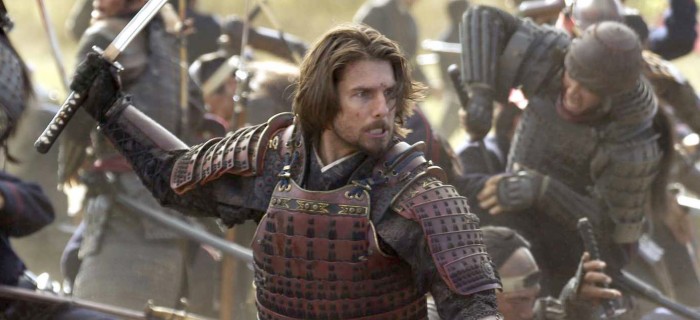 I'm curious about casting Woody Harrelson. Was that like a wide net to find the bad guy human or did you kind of come up with his name on the spot when you were thinking of him?Clark: You know, we did when we were writing the script, we thought he would be cool. You know, just he's just a great actor. He's got, I hate all these words, but he's got a serious weight to him. But he can play very tough. He's the antagonist of the movie. Bad guy's probably selling him a little bit short. He's the antagonist 'cause he's against Caesar and what Caesar's trying to accomplish.
I'm curious about casting Woody Harrelson. Was that like a wide net to find the bad guy human or did you kind of come up with his name on the spot when you were thinking of him?Clark: You know, we did when we were writing the script, we thought he would be cool. You know, just he's just a great actor. He's got, I hate all these words, but he's got a serious weight to him. But he can play very tough. He's the antagonist of the movie. Bad guy's probably selling him a little bit short. He's the antagonist 'cause he's against Caesar and what Caesar's trying to accomplish.
Woody was a name we always really liked. We thought, you just start to put people, you write the script and talk about it. You look at it, you're like who, you hope to have a quality actor. You don't wanna have to go stunt casting. You want somebody that can really do it.
That's why again, I love working on these movies. Fox has been great. Typically when you make a big tentpole movie like the one we made last time, and Jason Clarke who's my friend, Jason Clarke is not Tom Cruise or he's not Denzel Washington. So but we said, we really love Jason in Zero Dark Thirty and they said, we did too. And we said, we really would like to put him as kind of our human lead. And they were like that's cool. Not like you gotta go get Tom Cruise, who's great too, but if we had Tom Cruise show up in this movie, you guys would be like what?
It's Tom Cruise.Clark: It's a little bit like that. Although Cruise is a, I produced Oblivion. He's a friend and he loves these movies. So he's always like emailing me, I wanna play an ape or you know I have this, always messing with me. Like I figured it out, I'm gonna be this ape in the next movie. He's funny.Did the decision to shoot on 65 play into this Western kind of vibe?Clark: Let me just, let me run down exactly like it's Western yes, but really always we're going for epic. I referenced David Lean before. I'm not sure you would consider him a western director. Look some of these images I'm gonna show you some, you may like I've showed some people, friends or press, and they go wow, this feels like you're designing a new world. It doesn't feel like Lord of the Rings, but I'll compare it to Lord of the Rings and again, like I love the what the people bring to me. Like that interpretation's pretty cool.
And what I like about that is he built an entire world. [Peter] Jackson built for those Rings movies an entire world. We're not doing Lord of the Rings, that would be a little bit odd here. But we're building a world. And to answer your question, 65, that format we just, that wide angle format, we thought that would capture it. We look, we always, we don't like to be stage bound. We like to be in exterior places with big, the benefits of making a movie is that we can get high and wide. I don't have to do tight coverage. We, Matt wants to get you some big stuff. We also have The Revenant over the break and we all fell over. Like just incredible filmmaking. So thank God we did 65. Chivo [Emmanuel Lubezki] used 65 for a couple of those sequences and they look beautiful. It's just stunning.
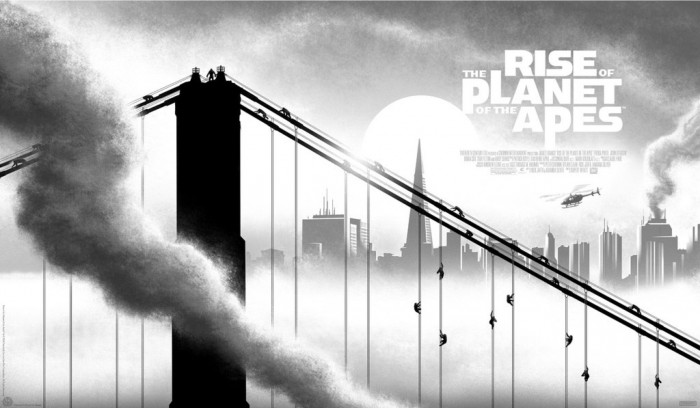 With regard to discussion of genre, I'd say the first movie had more of a sci-fi bent. I mean, this is a science fiction series overall, but would you say there is a like sort of influence on this movie or is it kind of more pushed back?Clark: I always believe that we are sci-fi. And I think sci-fi has changed throughout the era. Certainly, as we were talking about before, you could do sci-fi to really mess with your head. I mean, look there was a guy who wrote The Twilight Zone, writing the original Planet of the Apes. Like it was meant to mess with you. An allegory was a bigger thing then. Or like a more direct thing then. Cinema then.
With regard to discussion of genre, I'd say the first movie had more of a sci-fi bent. I mean, this is a science fiction series overall, but would you say there is a like sort of influence on this movie or is it kind of more pushed back?Clark: I always believe that we are sci-fi. And I think sci-fi has changed throughout the era. Certainly, as we were talking about before, you could do sci-fi to really mess with your head. I mean, look there was a guy who wrote The Twilight Zone, writing the original Planet of the Apes. Like it was meant to mess with you. An allegory was a bigger thing then. Or like a more direct thing then. Cinema then.
This is sci-fi. It is. How sci-fi do we get? It's grounded. And I think that's, you know, people have called it science fact. Did they try to cure Alzheimer's the way we showed? No. But could that, is that in the zone? Yes. We talked to scientists. We talked to people who are developing drugs. Virus-based blood barrier kinds of mechanisms are being developed. So it's in the vernacular. We just put it together in ways that can only happen in a movie. But we tried, we always try to ground it. But just kind of the what if is always the great question in these movies. That's sci-fi. And certainly present in this movie. So that should continue.
You know, look, Caesar says the great line in the last movie that Matt came up with. He's sitting there talking to his son after he's realized what Koba did. The duplicity of Koba. And he says, I didn't know how much like them we are. Like we turned it on its head. And it's like that's a big sci-fi idea. That's cool. There's some things in this movie that are like that as well.
It's refreshing. I've talked to so many producers who shy away from that sci-fi angle.Clark: Yeah, I mean, again–We can't tell you the number of roundtables we've been in where actors and filmmakers are ashamed of the word science-fiction.Clark: No, I know that. And it's unfortunate. I get it. Look, unfortunately there's this perception that sci-fi is not commercial. It's simply not true.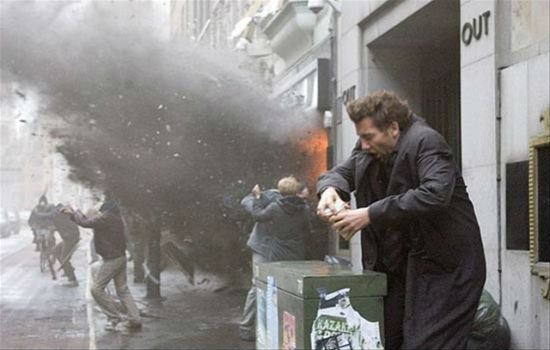 As the top 10 movies of all time–Clark: Correct. 100 percent correct. What you can say though is there was a string of sci-fi movies that didn't work. And maybe they pushed it too far or maybe they were too challenging. They were probably too, like for instance, when I was a studio executive, I happened to have the fortune of overseeing the movie, Children of Men. Science Fiction. P.D. James. Alfonso Cuaron. Chivo who just shot this amazing movie. Brilliant. Unfortunately it was a money loser. And one of those things. And a lot of people thought it was because it was sci-fi. It was too dark. It was dystopian. It was too challenging. It just was, we made it for too much money. And it didn't catch on. These things happen. But that movie done at a different time period or with less money, like that movie stands the test of time.Is it a money loser over the long like still to this day?Clark: I don't talk to the accountants at Universal. Because my deal is there now and I don't like to remind them of that. But I believe–My theory is that when you make something that's that good that it's like a long-term investment.Clark: I think that's a good theory. And as a producer, I agree with your theory. And the practical realities are look, studios have a tough job. They're bankrolling, these movies cost too much money. They do. It's crazy. These are big bets. And in order to make these big bets, unfortunately sci-fi got a bad knock and so people started getting away from that and code words about... So they started doing something else. They started subverting the sci-fi genre. We weren't subverting it. We inherited Planet of the Apes. It is a sci-fi premise. It's a sci-fi thing and that's what we're doing. We're not leading with the craziness. We are giving the audience this emotional connection to the characters that's not I think typical in science fiction. Maybe. Maybe that's atypical. I don't know.The literature...Clark: No, that's well literature too like that's another thing like people read sci-fi like crazy amounts. So you have big, big audiences out there that wanna consume this thing. It's just tricky to do. But as you said, it, when you do it right, they come, they love you for it. More than anything.
As the top 10 movies of all time–Clark: Correct. 100 percent correct. What you can say though is there was a string of sci-fi movies that didn't work. And maybe they pushed it too far or maybe they were too challenging. They were probably too, like for instance, when I was a studio executive, I happened to have the fortune of overseeing the movie, Children of Men. Science Fiction. P.D. James. Alfonso Cuaron. Chivo who just shot this amazing movie. Brilliant. Unfortunately it was a money loser. And one of those things. And a lot of people thought it was because it was sci-fi. It was too dark. It was dystopian. It was too challenging. It just was, we made it for too much money. And it didn't catch on. These things happen. But that movie done at a different time period or with less money, like that movie stands the test of time.Is it a money loser over the long like still to this day?Clark: I don't talk to the accountants at Universal. Because my deal is there now and I don't like to remind them of that. But I believe–My theory is that when you make something that's that good that it's like a long-term investment.Clark: I think that's a good theory. And as a producer, I agree with your theory. And the practical realities are look, studios have a tough job. They're bankrolling, these movies cost too much money. They do. It's crazy. These are big bets. And in order to make these big bets, unfortunately sci-fi got a bad knock and so people started getting away from that and code words about... So they started doing something else. They started subverting the sci-fi genre. We weren't subverting it. We inherited Planet of the Apes. It is a sci-fi premise. It's a sci-fi thing and that's what we're doing. We're not leading with the craziness. We are giving the audience this emotional connection to the characters that's not I think typical in science fiction. Maybe. Maybe that's atypical. I don't know.The literature...Clark: No, that's well literature too like that's another thing like people read sci-fi like crazy amounts. So you have big, big audiences out there that wanna consume this thing. It's just tricky to do. But as you said, it, when you do it right, they come, they love you for it. More than anything.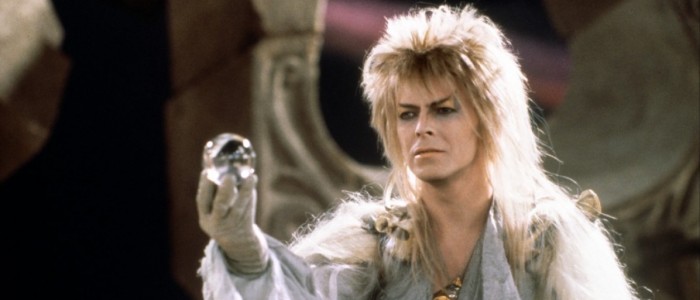 Bowie's greatest album. Arguably the greatest album of all time, Ziggy Stardust and the Spiders from Mars. It's like I will never understand why people are ashamed of science fiction.Clark: They're afraid of it. I think it's the most challenging and I think they haven't quite figured out how to do it in a populist way. Look, the truth is like most people are comfortable with pop radio. And not Ziggy Stardust. 'Cause those are outliers. Like every now and then you get this person that does that's Bowie and they kill it and you're like thank God, because I can't listen to any more Rihanna. But I like Rihanna because in the pop artist world, she's pretty good. But there's like 20 others that people listen to constantly. My unfortunate sons. And I'm always like how can you listen to this shit, guys? But they like it 'cause it's pop radio. So a lot of like and I always, you know, making movies is a lot like music to me, right? And you're trying to give them Bowie, but Bowie's hard to find. But right underneath that like pick whoever you think your best pop artist is but that's what you really are trying to do. Because it is a commercial endeavor. The job is to get butts in the seats and be entertained and be moved. And then hopefully go oh you know what and it was better than that. Song that sounded like that other song that sounded like the song last year. And that's where like again, is Adele my favorite act? No, but is Adele at the top of the pop artists? Yeah. 'Cause she's doing some original stuff. But is she David Bowie?Nobody's David Bowie.
Bowie's greatest album. Arguably the greatest album of all time, Ziggy Stardust and the Spiders from Mars. It's like I will never understand why people are ashamed of science fiction.Clark: They're afraid of it. I think it's the most challenging and I think they haven't quite figured out how to do it in a populist way. Look, the truth is like most people are comfortable with pop radio. And not Ziggy Stardust. 'Cause those are outliers. Like every now and then you get this person that does that's Bowie and they kill it and you're like thank God, because I can't listen to any more Rihanna. But I like Rihanna because in the pop artist world, she's pretty good. But there's like 20 others that people listen to constantly. My unfortunate sons. And I'm always like how can you listen to this shit, guys? But they like it 'cause it's pop radio. So a lot of like and I always, you know, making movies is a lot like music to me, right? And you're trying to give them Bowie, but Bowie's hard to find. But right underneath that like pick whoever you think your best pop artist is but that's what you really are trying to do. Because it is a commercial endeavor. The job is to get butts in the seats and be entertained and be moved. And then hopefully go oh you know what and it was better than that. Song that sounded like that other song that sounded like the song last year. And that's where like again, is Adele my favorite act? No, but is Adele at the top of the pop artists? Yeah. 'Cause she's doing some original stuff. But is she David Bowie?Nobody's David Bowie.
[Clark begins to show us concept art on his laptop]
Clark: Why don't you guys huddle around me? We're gonna do it poor man style. Okay, so as I said, these are this is key art, guys. This doesn't necessarily mean this is not a shot in the movie. This is just a design. And this is the opening battle. You have some guys in military fatigues and you see some apes. What side are the apes on? I don't want you to write about that. That looks like a big explosion. That looks like apes flying in the air. I wish I had that shot. I don't think I do. You got apes on horses throwing that back down at them. You got Caesar walking through what looks like a pretty badass ape structure which is cool. After that, this movie, I'll give you a little secret, this movie we call it Hidden Fortress, because the humans have been after Caesar for some time. And as I said to you, it was very important digitally for Matt to start you guys out, start the audience out in a world that looks very familiar and then take you into a different world. The Hidden Fortress, because the apes survival depends on it, is through practical tunnels in Othello that we shot beautiful, beautiful, and then we CGI'd this waterfall. And behind that resides this kind of thing.Is that the all C.G. location?Clark: It is. That is a digital set. This is after apes getting killed, this is the stuff that weighs on Caesar. Beautiful, we shot up at Allowen Lake. Just a–Like a Viking funeral?Clark: Well I don't know. See the movie first. Going past the remnants of the world. Coca-Cola, everybody knows. Oyster Farm, this is where he picks up somebody. This we shot out in Tofina.You know, it's rare that the movie looks better than the concept art.Clark: Oh come on. When that's rendered and that's Caesar and the gang. I mean, we got a ton of that stuff. So we got that going for us. We got some of this stuff. We got some of that. We got, I don't know what that is. We got it. We got that dude. Or he's a ghost. Again, I can't tell–That's not Steve Zahn?Clark: That is absolutely not Steve Zahn. We got, okay, we got this. We got, we're up in the snow as I told you on horses. We got an ice chalet, Doctor Zhivago. We got Steve Zahn. We got somehow this tree is growing. In the snow. But you guys better not call bullshit on that one, 'cause I happen to like a gorilla giving a little girl a flower. Right? Look at that. We got that. We got this shit. We got that shit. Here. We got some really crazy, look at this. Bang, bang, bang, bang. Bang. Here's the thing, are the apes gonna win? I hope so. I do. I feel like–Well if you have apes on both sides...Clark: No, it's not like that. Again, and I really like as the last movie, there was a conflict. Some saw Caesar weak. Some saw Koba strong. Small percentage. Most people, most apes in particular aren't gonna leave Caesar. He's too good. So and in this movie, a lot of it is his choice because of the, you know, he's the... The thing I love about the character, he's the leader you want in this world. You want these leaders in every country to be acknowledging the truth and it's just and so it feels very real. He feels pain. He's emotional. And he's flawed. He's killed Koba in the last movie. And he feels flawed because of that. But if Andy ever comes in here, I want you to ask him about that concept. So but don't again, like I hope you guys aren't leaving here thinking oh that, the story is the other apes on the other side. That's a piece of it. And again, when you see the movie, I think you'll go Matt Reeves is a very special director because he's looking at all the characters and he's thinking how can I complete everyone's journey on every side? So if we introduce a character, they're gonna have a setup and payoff. They're gonna come around. They're gonna start the movie here and they're gonna end here. And that includes pretty much everybody, antagonist and protagonist.What is Woody Harrelson's character after?Clark: He's after survival. He wants to win. And he believes that the apes stand in the way.So it's not annihilation of the apes.Clark: It is annihilation of the apes. Because to him, because man's hubris has created these apes and the world has now smacked man around because through this the virus was released. And problems have happened. And he's now trying to navigate how to deal with this. And he's a hardliner. So apes are a very big problem for the survival of mankind. The other thing in this movie is much like the Spanish flu of 1918, there is the virus has mutated. And so it hasn't stopped. So there's it's the gift that keeps on giving. In the worst possible way.Koba is mentioned in some way?Clark: Koba's definitely a part of this story. For Caesar, right? 'Cause he's wracked with the guilt and haunted by that act. He's not alive.No. He's mentioned. Like are you worried about audiences not knowing who Koba is?Clark: No, I think it'll be explained in the story. Yeah. I'm not worried about that.My interpretation, the end of Dawn it was very clear that there was gonna be another film just by the way it ended like on the last lines. Are you going into this film with the attitude of making more in the future and are you planning ahead for that?Clark: I would always wanna make more of these. I love them. And I think I love them in particular because the characters are so great. And I think we have more mileage left to tell with these characters. You really have to take them, you have to fit, you have to write and shoot a complete story and movie. You have to. And again, the truth is we had a different ending in the script. I'll be really like honest. Like I think it was our weakest thing. We didn't know how to end that last movie. And we found that. And we didn't do it as a cliffhanger. We just, we did it because that felt right in the moment. This movie has a better ending. It's a much more complete story. If this happened to be the last movie from this run, then so be it. I think people would go like that was a very good end of this three movies of Planet of the Apes. God, I wish I could spend more time with Caesar and these gangs, but that's a pretty satisfying ending. But I think people will wanna see more. And I think and again, like as I said, we introduce Steve Zahn's character. That should put in the audience's mind oh if this ape's here, are the apes in France smart? Are they ever gonna get to Germany and China and hopefully Tahiti so we can make the movie down there? They have zoos down there?Apes in sand, that's your next thing.Clark: Just some surfing apes. At some point forget the goblets and all that other stuff we were talking about. Surfing apes. Now I don't know...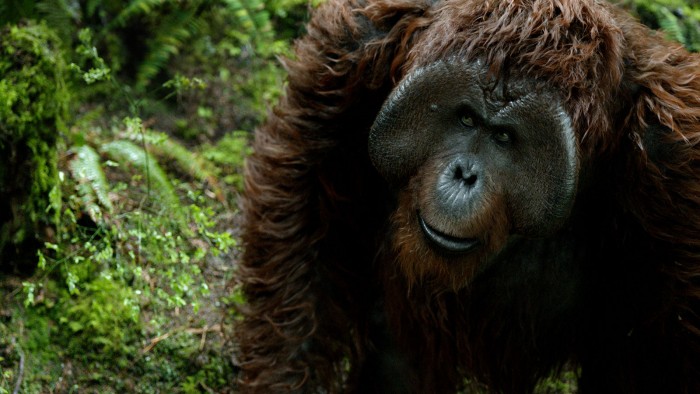 Coachella.Clark: David Bowie apes. I don't know. I'd like to, I'm hopeful that, you know, 'cause again Karin [Konoval] came in here and talked about, I love, I think you can do a whole movie on Maurice. Do we have that in the works? We don't. But should we? Probably.I'd see it.Clark: Yeah, I mean, I think if you saw like where Maurice came from, we have a rich back story on Maurice you guys don't even know. You would freak out. He comes from the circus. Who taught him how to sign?Somebody in the circus?Clark: Yeah.A clown?Clark: But you know what I mean? Like that's just it, it's like 'cause you care about that character so much, you really can like sit around and this is the fun of my job, this is what I get to do for a living. It's crazy. It's so much fun. I get to sit with Matt and Mark [Bomback] and we go Maurice learned sign language. He did it at the circus. Was that where he learned it? So there you go, guys. I hope that stuff was, was it good?That was awesome.Clark: All of the good stuff is in the movie. The questionable stuff we've cut out. Thanks for coming by.
Coachella.Clark: David Bowie apes. I don't know. I'd like to, I'm hopeful that, you know, 'cause again Karin [Konoval] came in here and talked about, I love, I think you can do a whole movie on Maurice. Do we have that in the works? We don't. But should we? Probably.I'd see it.Clark: Yeah, I mean, I think if you saw like where Maurice came from, we have a rich back story on Maurice you guys don't even know. You would freak out. He comes from the circus. Who taught him how to sign?Somebody in the circus?Clark: Yeah.A clown?Clark: But you know what I mean? Like that's just it, it's like 'cause you care about that character so much, you really can like sit around and this is the fun of my job, this is what I get to do for a living. It's crazy. It's so much fun. I get to sit with Matt and Mark [Bomback] and we go Maurice learned sign language. He did it at the circus. Was that where he learned it? So there you go, guys. I hope that stuff was, was it good?That was awesome.Clark: All of the good stuff is in the movie. The questionable stuff we've cut out. Thanks for coming by.
